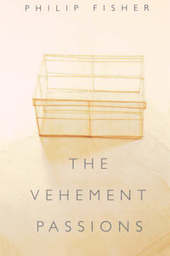
|
The Vehement Passions
Paperback / softback
Main Details
| Title |
The Vehement Passions
|
| Authors and Contributors |
By (author) Philip Fisher
|
| Physical Properties |
| Format:Paperback / softback | | Pages:280 | | Dimensions(mm): Height 229,Width 152 |
|
| Category/Genre | Philosophy - epistemology and theory of knowledge |
|---|
| ISBN/Barcode |
9780691115726
|
| Classifications | Dewey:128.37 |
|---|
| Audience | | Professional & Vocational | | Tertiary Education (US: College) | |
|---|
|
Publishing Details |
| Publisher |
Princeton University Press
|
| Imprint |
Princeton University Press
|
| Publication Date |
5 October 2003 |
| Publication Country |
United States
|
Description
The strong current of Western thought that idealizes a dispassionate world has ostracized the passions as quaint, even dangerous. Intense states have come to be seen as symptoms of pathology. A fondness for irony along with our civic ideal of tolerance lead us to prefer the diluted emotional life of feelings and moods. This work meditates on whether this victory is permanent - and how it might diminish us. From Aristotle to Hume to contemporary biology, the text finds evidence that the passions have defined the core of human nature no less important than reason or desire. Traversing "The Iliad", "King Lear", "Moby Dick" and other great works, it discerns the properties of the high-spirited states we call the passions. In reintroducing us to our own vehemence, the book reminds us that it is not only through our strongest passions that we feel the contours of injustice, mortality, loss and knowledge. It is only through our personal worlds that we can know the world.
Author Biography
Philip Fisher is the Reid Professor of English at Harvard University. He is the author of "Still the New World, Hard Facts, Wonder, the Rainbow, and the Aesthetics of Rare Experiences", and "Making and Effacing Art".
Reviews"I revelled in the new book by the brilliant American critic Philip Fisher, The Vehement Passions, which is about nothing less than what the title promises: thoroughness, rashness, fear, anger, grief, and more."--Susan Sontag, Times Literary Supplement "With this persuasive and elegant essay on the paradigmatic human passions of fear, anger, grief, and wonder, Harvard University English professor Fisher joins a growing group of scholars bent on emotional rehabilitation: restoring to respectability the emotions so distrusted by Enlightenment rationalism and the forms of Stoicism that pre-date it... It's also ... delightful. Fisher ingeniously mixes discussion of Achilles, Oedipus, Othello, Lear, and Ahab with careful critical assessments of Kantian ethics, rational choice theory, and the philosophical underpinnings of the legal system."--Mark Kingwell, Wilson Quarterly "A consistently engaging book... [It] manages to present a wealth of information in an admirably clear and accessible format... People outside of universities curious about how the emotions regularly manage to dominate our thinking and planning will enjoy this overview of a fascinating field."--Virginia Quarterly Review "A stimulating and provocative book, whose strength lies precisely in the compact selectivity with which it argues its case for the vehement passions."--John Higgins, The Times Higher Education Supplement "Philip Fisher's new book ... makes a daring case for the continued relevance of pre-Christian ideas about the passions. His argument is that we underestimate the positive potential of the 'vehement passions' long understood only as forces that must be suppressed or redirected if we are to develop healthy minds in a benevolent world."--David Simpson, London Review of Books "The Vehement Passions by Philip Fisher is one of those rare books that carries the unmistakable whiff of real originality ... one filled with striking insights, wide learning, unexpected correlations and connections that illuminate much in life and literature that we may have only half noticed... Page after page offers broad yet precise and often startling generalizations of the sort that made me first pause, then nod in assent."--Jeff Gundy, Georgia Review
|